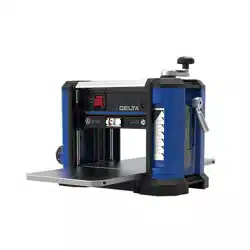Loading ...
Loading ...
Loading ...

6
FAILURE TO FOLLOW THESE RULES MAY RESULT IN SERIOUS PERSONAL INJURY.
PLANER SAFETY RULES
1. Do not operate this machine until it is completely assembled and installed according to the instructions. A machine
incorrectly assembled can cause serious injury.
2. Obtain advice from your supervisor, instructor, or another qualified person if you are not thoroughly familiar with the operation
of this machine. Knowledge is safety.
3. Follow all wiring codes and recommended electrical connections to prevent shock or electrocution.
4. Keep knives sharp and free from rust and pitch. Dull or rusted knives work harder and can cause kickback.
5. Never turn the machine “ON” before clearing the table of all objects (tools, scraps of wood, etc.). Flying debris can cause
serious injury.
6. Never turn the machine “ON” with the work-piece contacting the cutterhead. Kickback can occur.
7. Secure the machine to a supporting surface to prevent the machine from sliding, walking or tipping over.
8. Properly secure the knives in the cutter-head before turning the power “ON”. Loose blades may be thrown out at high
speeds causing serious injury.
9. Do not place the power cord under the cutterhead when moving or storing.
10. Avoid awkward operations and hand positions. A sudden slip could cause a hand to move into the knives.
11. Keep arms, hands, and fingers away from the cutterhead, the chip exhaust opening, and the feed rollers to prevent severe
cuts.
12. Never reach into the cutterhead area while the machine is running. Your hands can be drawn into the knives.
13. Do not stand in line of the workpiece. Kickback can cause injury.
14. Allow the cutterhead to reach full speed before feeding a workpiece.
15. When planning stock, place the concave (cup down) side of the stock on the table and cut with the grain to prevent kickback.
16. Do not feed workpiece that is warped, contains knots, or is embedded with foreign objects (nails, staples, etc.). Kickback
can occur.
17. Do not feed a short, thin, or narrow workpiece into the machine. Your hands can be drawn into the knives and/or the
workpiece can be thrown at high speeds. See the “OPERATION” section of this instruction manual for details.
18. Do not feed workpiece into the out-feed end of the machine. The workpiece will be thrown out of the opposite side at high
speeds.
19. Remove shavings only with the power “OFF” to prevent serious injury.
20. Use for wood only. Do not plane man-made materials.
21. Properly support long or wide workpieces. Loss of control of the workpiece can cause serious injury.
22. Never perform layout, assembly or set-up work on the table/work area when the machine is running. Serious injury will
result.
23. Turn the machine “OFF”, disconnect it from the power source, and clean the table/work area before leaving the
machine. Lock the switch in the “OFF” position to prevent unauthorized use.
24. Additional information regarding the safe and proper operation of power tools (i.e. a safety video) is available from the
Power Tool Institute, 1300 Sumner Avenue, Cleveland, OH 44115-2851 (www.powertoolinstitute.com). Information is also
available from the National Safety Council, 1121 Spring Lake Drive, Itasca, IL 60143-3201. Please refer to the American
National Standards Institute ANSI 01.1 Safety Requirements for Woodworking Machines and the U.S. Department of Labor
Regulations.
PROPOSITION 65 WARNING:
Dust created by power sanding, sawing, grinding, drilling, and other construction activities may contain
chemicals known to the state of California to cause cancer, birth defects or other reproductive harm. Some examples are:
• Lead from lead-based paints
• Crystalline silica from bricks and cement and other masonry products
• Asbestos dust
• Arsenic and chromium from chemically-treated lumber
Your risk from these exposures varies depending on how often you do this type of work. To reduce your exposure to these
chemicals: work in a well-ventilated area and work with approved safety equipment, such as dust masks that are specifically
designed to filter out microscopic particles.
Avoid prolonged contact with dust from power sanding, sawing, grinding, drilling, and other construction activities.
Wear protective clothing and wash exposed areas with soap and water.
SAVE THESE INSTRUCTIONS
Refer to them often and use them to instruct others. • If tool is loaned to someone, also loan them these instructions.
Loading ...
Loading ...
Loading ...
